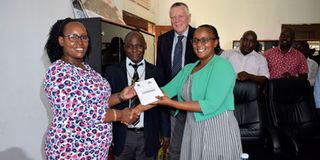Government issues fresh guidelines to meet global fish standards

L-R: Ms Allen Lutaaya, the principal Ass. secretary MAAIF recieving fishing guidlines from UNBS deputy executive director in charge of standards Ms Patricia Bageine Ejalu. Photo by Eve Muganga
ENTEBBE. The government of Uganda with partnership funding from the Commonwealth Standards Network has developed new guidelines to streamline the country's fishing industry.
The Uganda National Bureau of Standards (UNBS) together with Common Wealth Standards, developed the guidelines on the appropriate fishing gears, handling, and storage and preservation methods.
Government says the guidelines have been translated in both English and local languages suitable for different fishing communities, for easy comprehension and implementation.
During the handover ceremony of the guidelines document at directorate of fisheries in Entebbe on Friday, UNBS deputy executive director in charge of standards, Ms Patricia Bageine Ejalu said the documented set is to be submitted to the ministry of agriculture for distribution during sensitization campaigns among fishing communities across the country.
“As UNBS, we want to improve on the quality of products in Uganda especially fish; much as we are focusing on export market, we must make sure that what the standard in Uganda meets both national and international market. Let’s look at national product available and that exported and therefore we must meet standards by improving local products and make sure we maintain the export of fish,’’ she said.
The Commonwealth Standards Network team leader for Africa, Mr Graham Holloway said the initial project funded by the United Kingdom department for International Development is meant for Uganda and Zambia.
“We aren’t producing Common Wealth Standards but encouraging Common Wealth countries to train themselves how to produce quality by learning more on how to use standards that’s why we partnered with UNBS. We wanted to assist real people with real problems of getting their products to market, getting good price for their products which comes with quality,” he said.
Mr Tom Bukenya, the acting commissioner of fisheries control regulations and quality assurance said: "We had a number of these guidelines but basically were in English which wasn’t in favour of our people but since these documents have been translated in local languages, this is going to improve on the quality of our fish because our community will be able to read and understand these guidelines and also implement them.’’
The fisheries industry is the second largest foreign exchange earner, contributing 2.6 per cent of Gross Domestic Product (GDP) and 12 per cent to agricultural GDP.
According to Ministry of Agriculture records, Uganda has a fish capture potential of 750,000 tonnes annually; the current production is at 461,000 tonnes and 100,000 tonnes from aquaculture.



